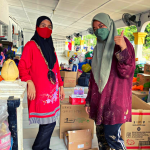Wunderman Thompson Intelligence, in collaboration with VMLY&R, Malaysia’s Muslim Intel Lab, has released a report on the ‘next wave’ of muslim influenced consumerism – an exploration of consumer change in a single generation.
It says that 250 million muslims across South East Asia, are today living lives different from their parents, shaped by a resurgence of faith and the spread of western consumerism.
Considered as important for brands to consider, as well as to avoid pitfalls, APAC Director for Wunderman Thompson Intelligence, Chen May Yee had this to say: “Muslim consumers are increasingly overlaying their religious beliefs on purchase decisions, and how they do so is constantly evolving. New technologies bring new questions.”
“The dynamics that permeate beliefs and the behaviour of muslims are essential to offer efficient solutions for connected brands. That is cultural commerce.” said Felipe Lampreia, Chief Strategy Officer, VMLY&R.
Offered Safa Arshadullah, Writer and Researcher at Wunderman Thompson Intelligence APAC: “South East Asia is more than just a muslim market – it’s a testing ground for the newest global trends.”
So, do advertisers and marketers need to swivel more toward this growing demographic? Perhaps, as some key insights of the report reveal.
Here are some revelations based on a survey of 1000 consumers across Malaysia and Indonesia conducted by SONAR, a Wunderman Thompson proprietary research tool.
Muslims today experience a constantly growing sense of spirituality. A high percentage (89% – 91%) places importance on their relationships with Allah, health and family in that order. Less than 35% say wealth, fame and following their passions are important.
The research also shows that men tend to make major buying decisions with 71% of men deciding on larger purchases in households while women focus more on daily purchases and holiday destinations.
A significant minority of households however have women as breadwinners with 42% saying they provide financial support.
Halal Consumerism
There is also growing adherence toward a halal lifestyle with over 90% saying this factor overrides product concerns like good value for money, high product quality and environmental friendliness.
Halal or Sharia compliant banking services are considered important as well as are investment products including the reputation of the financial institution, among other factors, such as ease of use of mobile websites and good returns on investment.
Travel is also an area becoming increasingly attractive to muslim consumers wishing to expand their perspectives beyond religious and heritage spots.
Here, food is a concern with 77% of respondents saying halal food availability, ahead of cost, is a key factor while 63% place an importance on the friendliness of governments and locals toward muslims.
Technology too is playing a role in the new muslim consumerism with many using it to further their halal lifestyle – including with more mobile app usage.
The report showed that 42% of women and 39% of men shop online at least once a month with payment apps being used far more than dating or health tracking apps.
The rise of the metaverse has also brought questions and concerns. The idea of muslim spaces in the metaverse has surfaced with worries regarding its compatibility with the islamic lifestyle and its teachings,
The idea of such spaces has generated interest among muslims with 85% saying they would like more spaces created for muslims, 49% saying they would like to attend prayers in such spaces while 78% were all for virtual religious accessories like hijabs and abayas for their avatars.
The naysayers, not believing in such compatibility, hover at 59%
On inclusion in the advertising industry, most muslim consumers think that while the industry does a good enough job, it is also felt that more can be done, such as greater variety and ‘nuanced depictions’ of the community.
The report showed that 36% think muslims are reflected very well, 57% say somewhat well while 14% think the community is not reflected very well or not well at all.
It also shows that 87% would like to see brands feature more people from ethnic minorities and those with disabilities with a ‘significant minority’ urging more visibility for the LGBTQ+ community.
MARKETING Magazine is not responsible for the content of external sites.
After 20 years of evolving technology, shifting market trends, and adapting to changing consumer behaviour, the media landscape has nearly reached saturation.
We’ve optimised to the fullest, providing advertisers with abundant choices across technology, platforms, data-driven marketing, CTV, OTT, DOOH, influencer marketing, retail, etc.
Media specialists have diversified, but with more options comes the challenge of maintaining income growth. The industry is expanding, but revenue isn’t keeping pace.
Now, we’re at a TURNING POINT: time to explore and harness new sustainable revenue streams. While GroupM forecasts a 7.8% global ad revenue growth in 2024, challenges like antitrust regulation, AI and copyright issues, and platform bans persist.
Collaboration is key: partnerships that thrive on synergy, shared values, and aligned goals are becoming increasingly essential.
Hence, the Malaysian Media Conference, in its 20th year, has assembled the partners and players under one roof on October 25 for a day of learning, sharing, and exploring.
REGISTER NOW










